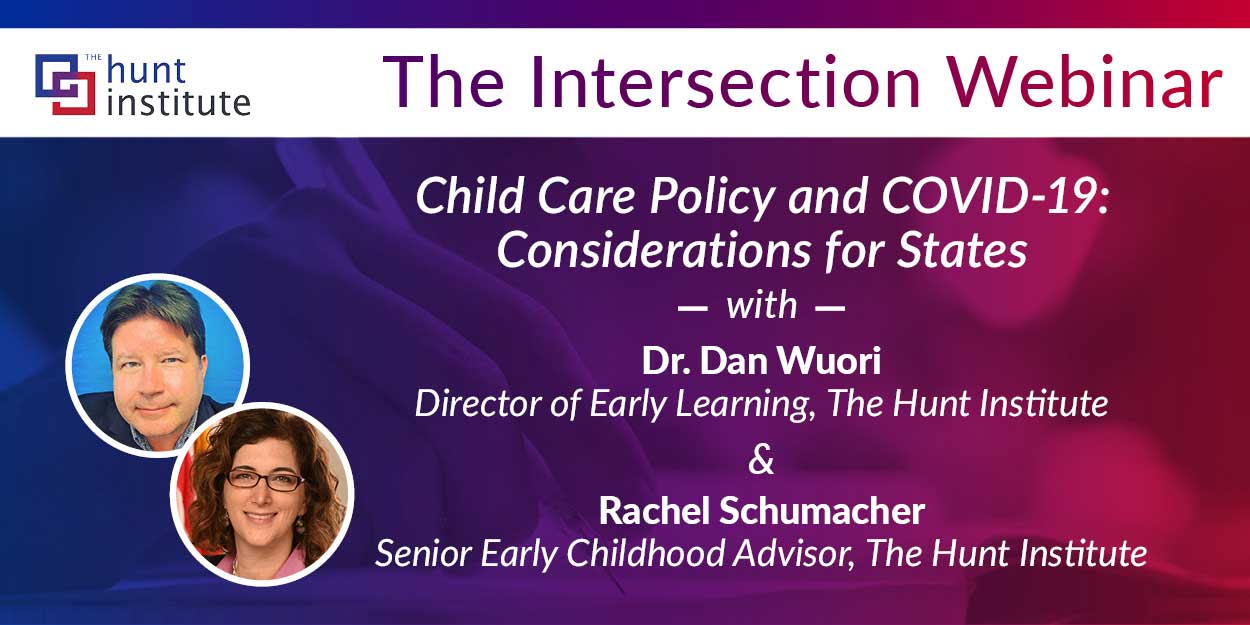 States across the nation are dealing with the challenge of simultaneously adhering to public health guidance about social distancing while still providing care for the children of “essential staff.” The Hunt Institute has been actively tracking state childcare actions in response to COVID-19, and has released a number of resources to guide policymakers in approaching this issue.
States across the nation are dealing with the challenge of simultaneously adhering to public health guidance about social distancing while still providing care for the children of “essential staff.” The Hunt Institute has been actively tracking state childcare actions in response to COVID-19, and has released a number of resources to guide policymakers in approaching this issue.
Key Takeaways:
- States have differed with their approaches to child care offerings in response to the COVID-19 pandemic.
- 16 states have closed child care offerings alongside their public school system, with an option to provide emergency care (AL, DE, HI, IL, KY, MD, MA, MI, NJ, NC, OH, OR, PA, VT, WV, WY).
- Rhode Island has closed child care services outright, and has temporarily cancelled all childcare licenses in the state.
- 33 States and the District of Columbia have offered the option to remain open
- Congress made an additional $3.5 billion available to states in the Child Care and Development Block Grant (CCDBG) as part of the Coronavirus Aid, Relief, and Economic Security (CARES) Act. According to CARES provisions, the CCDBG funding may be used to:
- Maintain payments and assistance to child care providers impacted by closures related to coronavirus;
- Provide child care assistance to essential workers during the response to the coronavirus; and,
- Fund child care providers with activities necessary to maintain or resume the operation of programs.
- The Federal Office of Child Care has clarified that states have flexibility to change key policies to address the crisis, including payment rates to reflect cost of care, bonuses targeted to workers, paying by enrollment, eligibility periods, and co-payments.
- With this additional funding and flexibility, state choices can help preserve and protect child care. Three essential elements that states should consider are:
- Preserving the supply of child care providers for children in low income families;
- Maintaining and promoting family stability through the crisis; and,
- Holding providers harmless for the increased costs of keeping children healthy, and help them to re-open.
- There are a number of additional policy considerations that should guide the work of policymakers developing emergency child care plans during the COVID-19 pandemic, including:
-
- Tracking the real-time availability of emergency care, and connecting families in need by using emergency approvals or temporary pandemic licenses for child care providers wishing to serve the children of essential staff.
- Limiting the creation of new, temporary child care facilities, tapping existing small businesses created, equipped, and pre-licensed to provide this care wherever possible.
- Exercising caution when suspending requirements designed to protect the health and safety of children.
- Looking for alternatives to group care, including expansion of paid family leave policies and/or the provision of cash payments or vouchers for family, friend, and neighbor care in trusted one-on-one settings.
- Further reducing the permissible size of classroom groupings in all remaining center-based care.
- Ensuring adequate compensation for staff providing emergency child care through the provision of bonuses or hazard pay.
- Taking steps to ensure the healthcare needs of staff providing emergency care.
- Enacting fiscal supports designed to replace lost tuition and ensure the solvency of the child care industry for the duration of the COVID-19 public health emergency.
For our full conversation with Dan and Rachel, please watch the webinar below.

Access The Hunt Institute COVID-19 Resources & Policy Considerations Page
See you at The Intersection!

The Hunt Institute team


 States across the nation are dealing with the challenge of simultaneously adhering to public health guidance about social distancing while still providing care for the children of “essential staff.” The Hunt Institute has been actively tracking state childcare actions in response to COVID-19, and has released a number of resources to guide policymakers in approaching this issue.
States across the nation are dealing with the challenge of simultaneously adhering to public health guidance about social distancing while still providing care for the children of “essential staff.” The Hunt Institute has been actively tracking state childcare actions in response to COVID-19, and has released a number of resources to guide policymakers in approaching this issue.